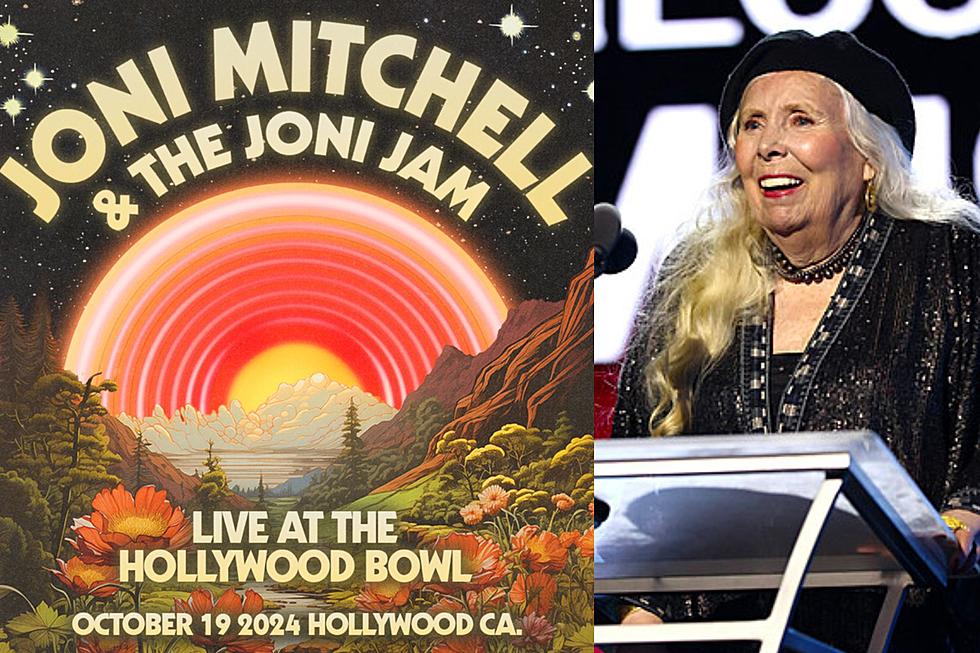
Joni Mitchell’s Landscape-Shifting ‘Blue’ at 50: Roundtable
Joni Mitchell held nothing back on her classic 1971 album Blue. From personal relationships to her own insecurities, every aspect of the singer-songwriter’s life was put on display.
The raw emotion and sheer vulnerability of the songs helped make Blue one of the most acclaimed albums in history. Still, Mitchell was unsure that such personal tracks would resonate with listeners.
"I couldn’t tell what I had created, really," the singer admitted during an interview with Cameron Crowe in 2021. "The initial response I got was critical, mostly from the male singer-songwriters. It was kind of like [Bob] Dylan going electric. They were afraid. Is this contagious? Do we all have to get this honest now? That's what the boys were telling me. 'Save something of yourself, Joni. Nobody's ever gonna cover these songs. They're too personal.'"
As Blue turns 50, we asked UCR’s writers to answer four questions about the album and its legacy.
Is Blue Joni Mitchell’s best album? Why or why not, and if not, what is?
Michael Gallucci: It's not only her best album, it's one of the best, and most influential, albums of all time. There were singer-songwriter albums before Blue; there were even singer-songwriter albums by women before Blue. But after that record, everything changed as far as artists opening a little more of themselves to listeners. It's one of the most personal albums up to that time. Fifty years later, it's still one of the most open, and candid, albums ever made.
Allison Rapp: Yes. There's no doubt that Mitchell's first three albums (Song to a Seagull, Clouds, Ladies of the Canyon) showcase quite a lot of her talent as a lyricist and arranger, but Blue is her most intimate, personal and vulnerable statement as a songwriter. There's an element of wisdom and experience to Blue that wasn't necessarily present on her earlier records, plus the distinct sense that Mitchell, usually fiercely independent, is letting her guard down in a way she had never done before and didn't do as intensely on subsequent albums.
Annie Zaleski: Most definitely. She transformed what folk-rock could be and sound like. Along with Judy Collins, she provided a much-needed female perspective to what was going on at the time in the lives of the post-Beatles generation, voicing with confidence how a rich inner life intersects with a tumultuous outer life.
Gary Graff: It's her best, but not necessarily the first album I'd refer to new listener. Its virtues - the raw intimacy, the vein-spilling vulnerability, the subtle instrumentation and those no-punches-pulled vocals - make for a tremendous song cycle but not always a comfortable listen. I'd probably send folks to Court and Spark, For the Roses or Ladies of the Canyon as more accessible gateways and then steer them to Blue once they're in the door.
What’s your favorite song on Blue and why?
Gallucci: "A Case of You" is breathtaking in its near simplicity. Mitchell's dulcimer and James Taylor's acoustic guitar are the musical bedrock here, and her lovely lyrics - "I could drink a case of you and still be on my feet" - pretty much disguise a breakup song in some of the most romantic lines ever written. The entire album plays along a similar path, but "A Case of You" is the standout moment.
Rapp: Every song on Blue seems to fit in perfectly with the others and tells its own unique short story, but "Case of You" will always be my favorite, if not just for its lyrics: "Part of you pours out of me in these lines from time to time." "Little Green" is a close second - Mitchell wrote it in 1966, two years before her debut album, after giving her daughter up for adoption, but the song was on the back burner for several years. It's an even more poignant listen knowing the weight the song must have carried for that long.
Zaleski: I know it's a cliche but "River." The more I listen and analyze the origins of the song, the more brilliant it becomes: It's a song full of contradictions - loneliness vs. being around others, feeling stuck vs. dreaming of a better life, solace vs. feeling bereft - but never feels chaotic, just the heartfelt musings of someone trying to figure it all out. Plus, using "Jingle Bells" as a tease for the song is brilliant; it conveys but also subverts the idea of sentiment.
Graff: "California" is a happy respite from the Blue fray. Love the way it personalizes the Golden State as a state of mind and being, and dresses it up with so many details it feels like you're hearing a movie. Plus, how can you argue with any track that has Jim Keltner, Sneaky Pete Kleinow and James Taylor playing on it, albeit quietly?
Is it the beginning of a new era for her? Or is it the end of her first era as a recording artist?
Gallucci: In some ways, it's both. She was slowly building to this moment since her 1968 debut, Song to a Seagull. That's a tentative record, but Mitchell's songwriting showed great promise, and she developed her voice on her next two albums, Clouds and Ladies of the Canyon. While Blue marked the end of this initial growth period, it also gave her the creative freedom and confidence to move on to the next stage of her career with the more jazz- and classical-minded For the Roses and Court and Spark. Every Mitchell album, really, from 1969-76 is a transitional one.
Rapp: Blue, overall, feels like the closure of one door and the opening of another, as though Mitchell had things she needed to get off her chest before moving onward both sonically and emotionally. There were new avenues to discover in terms of arrangements, instrumentation, chord structures and collaborations, but none of it really seems feasible without the definitive statement that Blue was.
Zaleski: I think it kicks off her imperial phase - Blue's creative structures and lyrical vulnerability opened up her songwriting and creativity and empowered her fearlessness.
Graff: I'd call it the latter and ending that first era on a high note. The albums that awaited - For the Roses, Court and Spark and beyond - brought in more instrumentation, a different sense of arrangement, different voices, most notably Tom Scott's, to accent the vocals that laid so bare on Blue and its predecessors. It's very much Mitchell reaching a (very satisfying) peak and moving beyond.
Because they're so intertwined with real (and famous) people, do the songs sound and feel too personal? Or do they strike a universal chord?
Gallucci: The first time I heard Blue, I had no idea the songs were connected to real people. It was only after a few years and countless listens that I found out that Graham Nash, James Taylor and others were the inspirations for these songs. I just assumed Mitchell, as other songwriters had done in the past, had pulled these songs from collective experiences and sources. So, I don't think they're too personal at all. Knowing the backstories now certainly gives the album more perspective, but in no way do they alter my first impressions of the album: I loved the album then, and it's still one of my favorites.
Rapp: Anyone who's ever loved someone can recognize and relate to the themes in these songs. Her lyricism is sharply specific in many spots on the album, but it's also the palpable emotion Mitchell's vocal delivery that really resonates with others. Of course, the songs are tailored to her life, but in this case, vagueness wouldn't have served the album justice. There's actually a lot of common ground between Mitchell and her listeners when it comes to personal romance and loss, which is a large part of why Blue has stood the test of time. There will always be love and heartbreak, and there will always be Blue to encapsulate that mood.
Zaleski: Not at all too personal; if anything, because they draw from her own life, they have extra passion and meaning. Of course, Mitchell's gift as a songwriter (well, one of them) is channeling real-world experiences into songs that are universal but also applicable to a variety of situations or life experiences. That's because she avoids the trap many lyricists fall into: She's not myopic but able to have some perspective on what she's been through and articulate her life experiences with clarity.
Graff: Boy, that's a toughie - especially since we know in retrospect (and did, to a degree, then) what was going on in her life. These are songs, sometimes explicitly, about very specific people (Graham Nash, James Taylor, Carey Raditz) and travels, with defining details in every one. But Mitchell writes in such a way that invites the listener to find themselves in her stories, and who hasn't felt like they're "on a lonely road ... looking for something to set me free" at some point in their lives?
Joni Mitchell Albums Ranked
More From Ultimate Classic Rock









